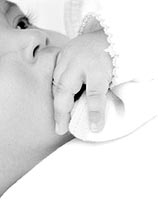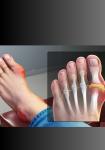You are expecting your first child and are feeling both excited and nervous.
Everyone is doling out advice about almost everything, including what you should and should not eat.
 In this flurry of information overdrive, here's what you need to remember. On an average, you require between 1,800- 2,000 calories per day. If you are pregnant, you need only about 300 calories extra each day for you to stay healthy and help your unborn child grow.
In this flurry of information overdrive, here's what you need to remember. On an average, you require between 1,800- 2,000 calories per day. If you are pregnant, you need only about 300 calories extra each day for you to stay healthy and help your unborn child grow.
You certainly do not have to 'eat for two' as the old saying goes.
First three months
A healthy, balanced diet includes adequate protein, vegetables, fruits, grains and dairy products.
Many women feel queasy or nauseated during the first three months of their pregnancy (also known as the first trimester). Eating small meals through the day, and dry crackers (such as Britannia's cream cracker biscuits) when you feel sick, may help.
You may lose weight due to nausea. Don't worry about it if your gynaecologist says you are okay.
Eating a variety of nutrient dense foods, consuming adequate calories and taking the prenatal vitamins prescribed by your gynaecologist are essential.
The second trimester
Your appetite will begin to increase as will your requirement for calories, vitamins, minerals and proteins. This resulting increase in energy is required for two reasons:
~ To increase the amount of blood in your body. Your growing baby requires this extra blood.
~ To nourish the growing uterus, prepare the breasts for lactation and increase overall fat stores that nourish the foetus.
Continue eating a variety of nutrient dense foods and taking your prenatal vitamins. Limit your intake of sweets and junk foods.
Last three months
Eat a balanced diet that includes fruits, vegetables, cereals and proteins like dals and pulses. Decrease the intake of salt, sugary products and fatty food.
Drink plenty of water to help reduce swelling and avoid constipation.
Try and avoid 'heaty' foods like dry fruits, raw papaya, grapes and pineapple.
Diet dos
~ Eat raw fruits, vegetables, prunes, whole grains or bran cereals like readymade wheat flakes.
~ Add one teaspoon of bran (wheat husk) flour to your wheat flour when making chapattis.
~ Increase your intake of fruits to at least three servings a day. Avoid fruits like papaya, pineapple and grapes.
~ Increase your intake of raw vegetables like cucumber, carrots, tomatoes, beetroot and lettuce leaves.
~ Avoid eating raw sprouts -- this can give you gas. Steam sprouts before you eat them.
~ Have at least one vegetable with every meal.
~ Drink at least one to two litres of fluid per day between meals, but not during meals. Your liquid intake could include juices, soups, coconut water, etc.
~ If you are constipated, have a cup of hot water three times a day.
~ Eat dry crackers, toast/ cereal before getting up or when feeling sick and to avoid nausea.
~ Eat smaller meals more frequently; say five to six meals a day.
~ Drink a glass of warm milk before sleeping to avoid insomnia.
~ Consume at least 0.4 milligrammes of folic acid everyday. Folic acid is found in vegetables, whole grain foods and citrus foods. It reduces the risk of birth defects of the spine and brain.
Folates, however, are easily destroyed by cooking, which is why it is recommended you have fresh vegetables like two to three leaves of lettuce, cabbage and cucumber. You can also include citrus fruits, juices, nuts, seeds, dried beans/ peas, bananas, tomatoes, etc, in your diet.
~ Ideally, your diet should supply all vitamins but since this is not feasible, you should take one multivitamin tablet every day.
~ Fish can form a part of your diet as it contains Omega3 fatty acid, an essential nutrient for a healthy delivery and lactation.
~ Vegetarians can fulfill their daily protein needs by having two to three cups of milk and milk products every day. Besides two cups of milk, non-vegetarians are advised to take one average helping of meat, fish, chicken or eggs.
~ Use low fat dairy products like skimmed milk, low fat cheese and yoghurt and soy products in your diet.
~ Use only lean meats like poultry and fish.
~ Bake, broil, grill or stir-fry your food instead of frying it.
~ For optimal absorption of an iron supplement or other non-meat iron sources, take it with a good source of Vitamin C like orange juice, grapefruit, cantaloupe, green pepper or broccoli.
~ Cut down on low calorie, low nutrient foods such as cakes, candy, pastries and soda.
~ Exercise regularly to keep from getting too tired. Exercise enhances stamina, strength and flexibility and can reduce stress. Walking is a good exercise.
Tip: Learn to control conditions like diabetes, epilepsy, high blood pressure and cardiovascular disease before you get pregnant; this will make your pregnancy easier.
Diet don'ts
~ Pregnant women are prone to acidity; avoid greasy, spicy foods as these alleviate acidity.
~ Try not to eat foods with strong smells (like garlic, onions, etc), to avoid nausea.
~ Avoid processed foods like pickles, papads, ketchups, jams, jellies, chocolates, chips and farsans.
~ Unless you are making it at home, avoid Chinese food. Most restaurants add ajinomoto or monosodium glutamate to their food. This is high in sodium content; too much sodium can lead to hypertension or high blood pressure.
~ Avoid outside food, especially non-vegetarian food like prawns, liver or any raw/ undercooked meats and eggs.
~ Don't lie down immediately after eating; go for a moderately paced walk instead. Try to have your food at least one hour before bedtime.
~ Avoid excess use of table salt.
~ Don't have too much caffeine; it suppresses the appetite. When had with or immediately after meals, it hinders the absorption of vitamins.
~ Avoid fasting during pregnancy as this causes a rapid fall of plasma glucose as compared to its fall in women who are not pregnant. Fasting increases body fat metabolism in the mother and, instead of glucose, the foetus is obliged to utilise ketones to get energy.
Ketones are produced when the body breaks down fat instead of carbohydrates to derive energy. This adversely affects foetal metabolism and development and lowers the foetus' IQ.
Don't diet when you are pregnant.
~ It would be a good idea to have an early breakfast.
~ Drinking alcohol is harmful. Alcohol may produce spontaneous abortion. A small dose may depress the foetus' breathing activity.
Heavy drinking during pregnancy is recognised as a major cause of mental retardation in the foetus. Though the facial malformation reduces with time, the small skull, short stature and low weight problems persist.
~ Smoke may harm the foetus due to exposure to nicotine, carbon monoxide or cyanide.
Smoking during pregnancy can increase the risk of spontaneous abortion. It also lowers the child's birth weight and raises the risk of prenatal mortality.
If a non-smoking mother is exposed to smoke during pregnancy, it can reduce the birth weight of the newborn.
Nicotine has been detected in the breast milk of mothers who smoke. In fact, children of mothers who smoke before and after conception have a higher risk of developing leukaemia or lymphoma.
Mothers who stopped smoking before pregnancy or soon after its onset gave birth to babies with an improved birth weight as compared to those mothers who continued to smoke through their pregnancy.
~ Avoid eating undercooked meat; it is a known source of toxoplasmosis, an infection that can seriously harm the foetus.
A balanced, nutritious diet will ensure the quality and quantity of your milk without depleting your body, paving the way for a healthy postpartum/ lactation period.
Seemaa Tarneja and Priya Khanna are consulting nutritionists, based in Mumbai.
DON'T MISS!
Photograph: Ankur Aras





